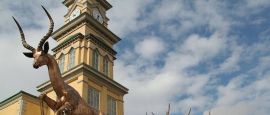Johannesburg History
The scene of the last great gold rush, it took less than 100 years for precious metal to turn a stretch of unprepossessing scrubland into South Africa’s economic hub. If only George Harrison, an Australian prospector, had had the prudence to see what lay ahead. He was the man who, in 1886, sniffed out gold in Langlaagte before selling his plot for £10 and moving on.
Except, there was still more gold to been found, and a vast mining operation swiftly established in the area. As it grew, mine owners became increasingly powerful, angering local citizens. One, Leander Jameson, attempted to stage a coup in 1895 which failed, leading to uitlanders (foreigners) being denied the right to vote. This triggered the Second Boer War in 1899 between the British and the South African Republic and the Orange Free State.
The British were unopposed when they marched into Johannesburg in 1900 and soon the mines began operating again, but with much more favourable conditions for the owners. There were other sources of tension too. By 1904, blacks were starting to be forced out of the city to places like Klipspruit and the South Western Townships (later Soweto). Their petitions and protests turned into riots and violence.
When the National Party won the 1948 election, apartheid was enforced, with new laws determining where people could live and work based solely on race. 4 million blacks were displaced and makeshift homes were bulldozed. In June 1976, apartheid came to a head when police fired at protesting Soweto students. This triggered revolts across Johannesburg’s townships and throughout South Africa, which continued until 1994, when apartheid ended and Nelson Mandela’s ANC party took power.
Today, Johannesburg is a thriving modern metropolis, complete with sparkling tower blocks and a vibrant cultural scene. Tension, however, remains, as does the crime rate. Nevertheless, as South Africa develops and pulls its citizens out of poverty, the future looks bright for its biggest city.
Did you know?
• Mahatma Gandhi began the Passive Resistance movement in Johannesburg.
• The black population of Johannesburg doubled during WWII, as manufacturing rose and whites left to serve in the military.
• 40% of the world’s human ancestor fossils have been discovered in Johannesburg.
Do you have any Feedback about this page?
© 2026 Columbus Travel Media Ltd. All rights reserved. No part of this site may be reproduced without our written permission, click here for information on Columbus Content Solutions.




 You know where
You know where